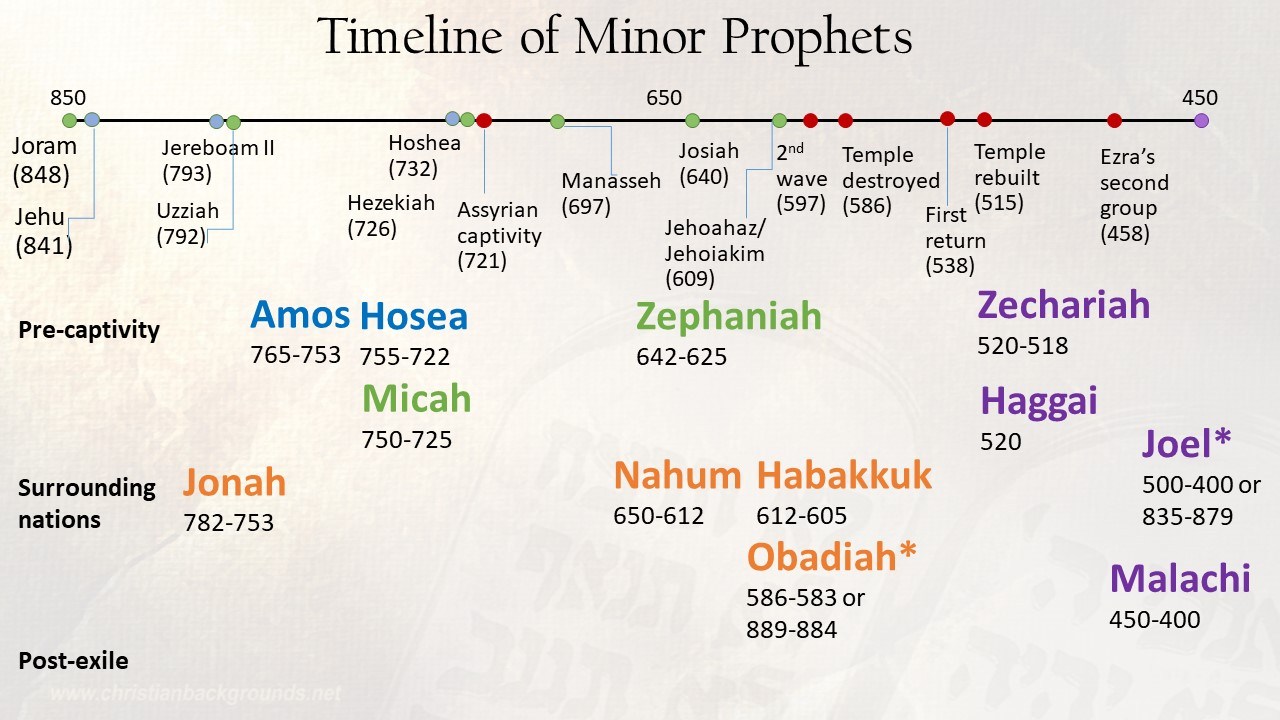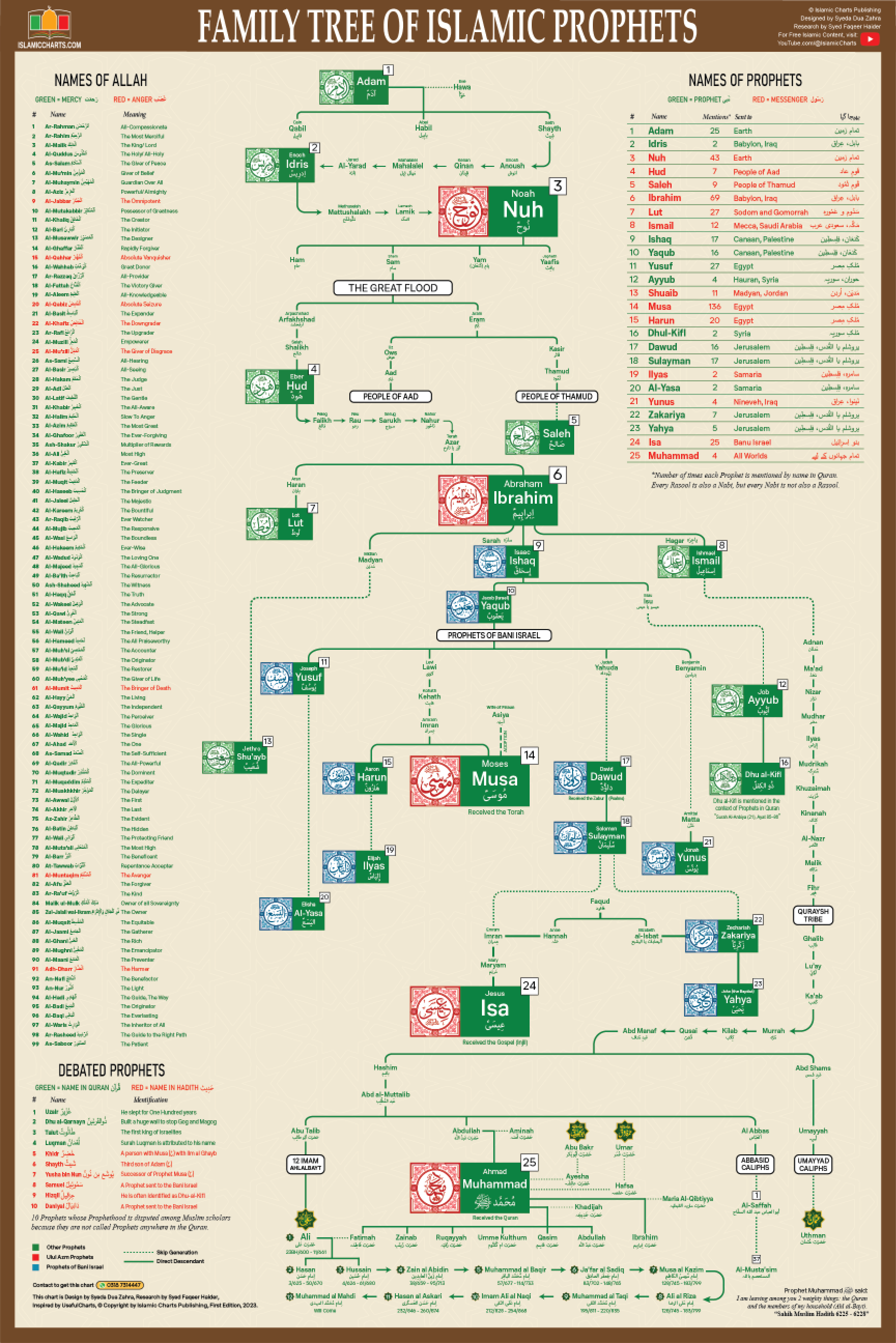The tapestry of faith is woven with threads of divine messengers, each illuminating the path towards truth and righteousness. These individuals, known as prophets in Islam, carried the message of the One God, Allah, to humanity throughout history. Their lives, teachings, and struggles offer profound lessons for believers today. In this comprehensive journey, we will explore the chronological order of prophets in Islam, understanding their roles, legacies, and the timeless message they convey.

Image: www.hamlinechurch.org
As a child, I was fascinated by the stories of these prophets—their courage, their trials, and the unwavering faith they displayed. Each story resonated with a sense of awe and inspiration. Understanding the chronological order of these great figures helped me appreciate the continuity of divine guidance throughout human history, a testament to the unchanging nature of God’s message.
The Chain of Messengers: Tracing the Path of Divine Guidance
The concept of prophets in Islam is fundamental to the faith. They are chosen individuals entrusted with conveying Allah’s message to specific communities at specific times. This message, universally emphasizing monotheism and ethical conduct, serves as a guide for humanity’s spiritual and moral development. These messengers played a crucial role in shaping history and leaving an enduring legacy of faith and values.
The Quran, Islam’s sacred text, explicitly mentions over 25 prophets, acknowledging them as a seamless chain connecting humanity to the Divine. Each prophet carried a unique message tailored to the needs and understanding of their respective communities. While the specifics of their teachings might have differed, the core principles of faith in the One God, righteousness, compassion, and justice remained consistent. These messengers served as exemplars, demonstrating the embodiment of faith and righteous living.
A Chronological Exploration of Prophetic Figures
To truly comprehend the significance of prophets in Islam, understanding their chronological order is essential. It allows us to trace the evolution of divine guidance, observing how the message adapted to diverse societies and historical contexts. While the exact chronology may differ slightly in various sources, the general sequence remains consistent.
The earliest prophets mentioned in the Quran are:
- Adam (A.S.): Considered the first human and prophet, created by Allah and tasked with leading humanity.
- Idris (A.S.): Known for his exceptional knowledge and piety; he is said to have ascended to heaven.
- Nuh (Noah): Preached monotheism and warned his people about the coming flood.
- Hud (A.S.): Sent to the people of ‘Ad, known for their arrogance and oppression.
- Salih (A.S.): Preached monotheism to the Thamud tribe, known for their idolatry and cruelty.
- Ibrahim (Abraham): Considered the father of monotheism and the ancestor of many prophets, including Ishmael, Isaac, and Jacob.
Following Ibrahim, we encounter prophets who continued to carry the message of monotheism and ethical conduct to various peoples, including:
- Lut (Lot): Sent to the people of Sodom and Gomorrah, known for their deviant behavior and disregard for God’s laws.
- Isma’il (Ishmael): A son of Ibrahim, known for his obedience and submission to Allah.
- Isaac (A.S.): Another son of Ibrahim, known for his piety and devotion.
- Yaqub (Jacob): A son of Isaac, known for his struggles and eventual triumph through his unwavering faith.
- Yusuf (Joseph): A beloved son of Jacob, known for his extraordinary dreams, his resilience in the face of adversity, and his ultimate rise to power in Egypt.
- Shu’aib (A.S.): Sent to the people of Midian, known for their cheating and dishonesty.
- Musa (Moses): The prophet to the Israelites, known for receiving the Ten Commandments on Mount Sinai, leading his people out of slavery in Egypt, and establishing the laws of Jewish faith.
- Harun (Aaron): Brother of Musa, known for assisting him in leading the Israelites and advocating for them.
- Dhu al-Kifl (A.S.): Known for his compassion and healing abilities.
- Dawood (David): A prophet known for his wisdom, his skill in music, and his leadership of the Israelites as a righteous king.
- Sulaiman (Solomon): Son of David, known for his wisdom, his immense wealth, and his ability to communicate with animals.
- Ilyas (Elijah): Sent to the people of Israel during a time of idolatry, known for his powerful miracles.
- Al-Yasa (A.S.): A prophet sent to the people of Israel, known for his warnings against injustice and oppression.
- Yunus (Jonah): A prophet who fled from his duty but was ultimately forgiven by Allah.
- Zakariya (Zechariah): A righteous prophet who prayed for a child and was miraculously granted John the Baptist (Yahya) as his son.
- Yahya (John the Baptist): A prophet who preached the message of repentance and prepared the way for Jesus.
Finally, we arrive at the crucial final messengers in the Islamic timeline:
- ‘Isa (Jesus): A prophet who brought a message of peace, love, and forgiveness. He is considered a messenger of God in Islam, but not divine as Christians believe.
- Muhammad (Peace be upon him): The final prophet and messenger of Allah, sent to all of humanity with the complete message of Islam. He is considered the culmination of the Prophethood and the seal of the messengers.
The Significance of Prophetic Order: A Universal Message for Humanity
The chronological order of prophets in Islam reveals a fascinating narrative, highlighting the continuity of divine guidance across time and cultures. It emphasizes that the core message of Islam is universal, unchanging, and relevant to all humanity. Every messenger, while catering to specific contexts, delivered a message rooted in monotheism, moral uprightness, and social justice.
As we contemplate the lives of these prophets, we learn valuable lessons about faith, perseverance, and the challenges of standing up for truth in a world often filled with darkness. Their stories inspire us to become better human beings, to strive for moral excellence, and to embrace the universal message of peace, unity, and compassion that lies at the heart of Islamic teaching.

Image: ar.inspiredpencil.com
The Importance of Studying Prophetic Lives: Tips for Understanding and Applying Their Wisdom
For believers, studying the lives and teachings of prophets is not just a historical exercise but a continuous journey of spiritual growth. Here are some tips to enhance your understanding and application of prophetic wisdom:
- Read and Reflect: Devote time to reading the Quran and Islamic narratives about prophets. Reflect on their struggles, their triumphs, and the lessons they convey.
- Seek Guidance: Engage with scholars and mentors who can provide insightful interpretations and guidance on prophetic teachings.
- Connect the Dots: Understand how the message of each prophet complements and builds upon those before them.
- Apply in Daily Life: Seek to embody the values and principles taught by the prophets in your daily interactions and choices.
By actively engaging with the lives of prophets, we can cultivate a deeper connection to our faith and draw inspiration for our own journey towards a meaningful and righteous life.
Frequently Asked Questions
Q: Are there any other prophets besides those mentioned in the Quran?
A: Yes, there are many prophets mentioned in Islamic tradition who are not explicitly named in the Quran. However, the core belief is that every community received a prophet to guide them towards the true faith.
Q: What is the significance of the finality of the Prophethood with Prophet Muhammad?
A: The finality of the Prophethood means there will be no other prophet after Prophet Muhammad. His message is complete and universal, encompassing all previous revelations and offering guidance for all of humanity for all time.
Q: How can I learn more about specific prophets?
A: There are many resources available, including books, articles, and online platforms. Engage in research, discuss with scholars, and explore the wealth of knowledge available on the lives and teachings of each prophet.
Chronological Order Of Prophets In Islam
Conclusion: A Call to Action and Ongoing Exploration
In understanding the chronological order of prophets in Islam, we uncover a timeless narrative of divine guidance, revealing the consistent message of One God, righteousness, and compassion. As we contemplate their lives and teachings, we are inspired to live with purpose and meaning, embracing the enduring values they embody.
Are you interested in learning more about the specific stories and teachings of individual prophets? Let us know in the comments section below, and we can delve deeper into their fascinating narratives and enduring wisdom.






